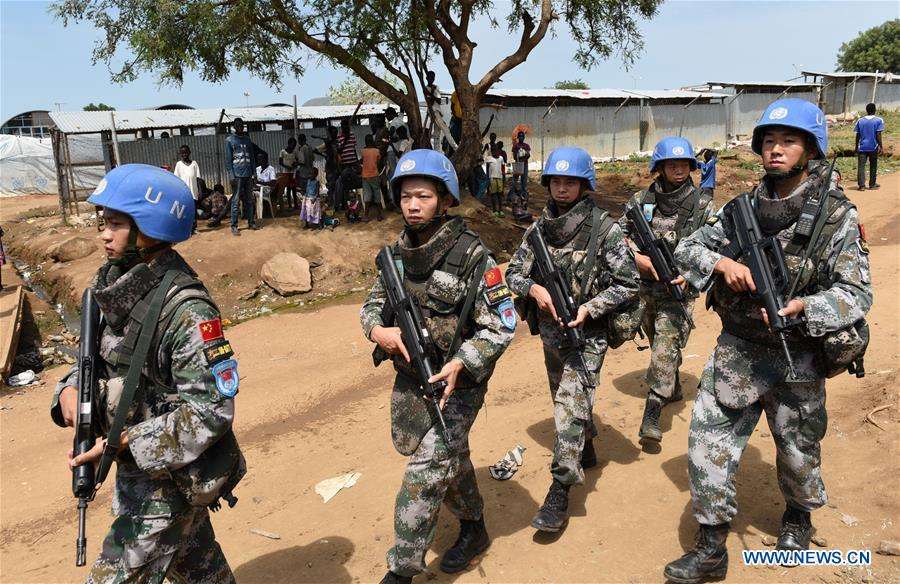
A total of 218 members of the engineering and medical units of the 20th batch of Chinese peacekeeping forces in DRC have recently received the UN Peace Medal of Honor there, the highest honor for peacekeepers, also called the "blue helmets".
Since entering task area in September last year, the peacekeeping forces have built roads and helped the locals in other ways, and are called "Chinese brothers" by government soldiers.
SAFETY TEST IN A FOREIGN COUNTRY
The 20th batch of Chinese peacekeeping forces were dispatched to the central African country at a turbulent time, when an anti-government parade took place in capital Kinshasa, which then prompted clashes and bloodshed, leading to the death of more than 30 people.
At that sensitive period, the peacekeeping forces traveled from afar and began their mission in the restive country.
Due to the long-time occupation of multiple foreign and local rebel forces in the eastern area, the safety of team members has been quite worrisome.
Second vehicle squad leader Xu Bin will probably never forget the time he dug up an unexploded mortar last October. Xu was constructing a defensive facility with a shovel, when some dark red matter was exposed to light. He took a closer look and broke into a cold sweat.
An unexploded bomb! Xu immediately shouted at team member Liu Xu, and told him to notify others to evacuate at once. In a short time, all soldiers, sentinels and cooks nearby evacuated.
But a power generator set was located just 20 meters from the site - if anything happens, the consequence would be unimaginable.
Deputy Commander Zhang Qing, among others, came to the scene, determined the bomb was a 60mm mortar, and decided to report to a special UN dispatch team.
Three hours later, UN staff arrived, removed the mortar and induced the explosion with the support of the Chinese team. The crisis was solved.
The rapid response and proper handling of the situation by the engineering unit were highly praised by the UN's mine operations department.
BUILDING ROAD IN INDIGENOUS FOREST
The northern part of DRC has a tropical rain forest climate, with frequent breakout of infectious diseases such as malaria and cholera.
In May, the World Health Organization announced that the Ebola epidemic resurfaced once again in the north of the country. But just a few hundred kilometers away, the engineering team's progress did not slow down.
The road under construction by the engineering unit goes through the indigenous forest, but serves as a key connection between Bukavu, the capital of South-Kivu Province, and Kisangani, the capital of Tshopo Province.
As the second largest country by land area in Africa, the DRC has weak infrastructure and underdeveloped land traffic.
The road was originally opened up during the Belgian colonial period in the 1950s, according to local officials. After more than six decades, it is dilapidated beyond recognition, with numerous 1-meter-plus big pits along the way, making it difficult for even motorcycles to pass, let alone trucks.
Team members had encountered attacks by gorillas and poisonous snakes while building the road, and had to be careful about potentially dangerous mosquito bites.
Kalehe Contingent team leader Zhu Guorui said roads are quite developed in his hometown Shandong Province. When he came to DRC, he was shocked by the vast gap in infrastructure. More than 60 percent of accidents in the area are related to traffic, he said.
Zhu told Xinhua that he could feel a longing for a better life by local residents. Simple dirt roads built by peacekeepers are called "high-speed road" by the locals, he said.
"CHINESE NOT FRIENDS, BUT BROTHERS"
For the past 27 years, China has devoted itself to peacekeeping missions in conflict-torn countries, and the contribution of China's "blue helmets" has earned applause and respect from the international community.
China first participated in UN peacekeeping missions in 1990, when five military observers were sent to Damascus, the capital of Syria.
Since then, China has dispatched a total of 35,000 person-times of peacekeeping and military personnel to take part in 24 UN missions.
Currently, China contributes 2,512 people to UN peacekeeping missions, according to UN official statistics. On average, the Asian country contributes more troops to UN peacekeeping missions than any other permanent member of the UN Security Council.
"China is a country with dreams, everyone has his own dream, and Chinese soldiers here have shared their dreams with the Congo people," said Ahsande Ullah, a staff sergeant from Pakistan peacekeeping forces.
Ahsande provides armed guards for Chinese engineering units in the DRC, allowing him to become more acquainted with the Chinese than would be otherwise.
Chinese soldiers are diligent and down to earth, they have built roads and bridges here and turned things in order, Ahsande said, noting that even local resident short of food occasionally help Chinese soldiers clear roads of stones. Some even offer the soldiers food like bananas.
"Chinese engineering soldiers built roads for us, we could thus transport bananas in the mountains to markets for sale and buy some daily necessities. Everyone has the money to buy a motorcycle, and lives are getting better day by day," Captain Arthur of the DRC government forces said.
As of July 20, the engineering unit has built 57.7 km of roads, and completed more than 30 construction projects.
The medical unit has accepted roughly 1,430 patients, and took part in emergency treatment for Pakistani personnel injured in a fire and the treatment of Egyptian special forces in a major accident during helicopter training.
Whenever Captain Arthur hears someone says Chinese people are friends of the DRC, he has a simple reply ready. "The Chinese treat us like brothers," he says. "They are not friends, but brothers."
Source: Xinhua